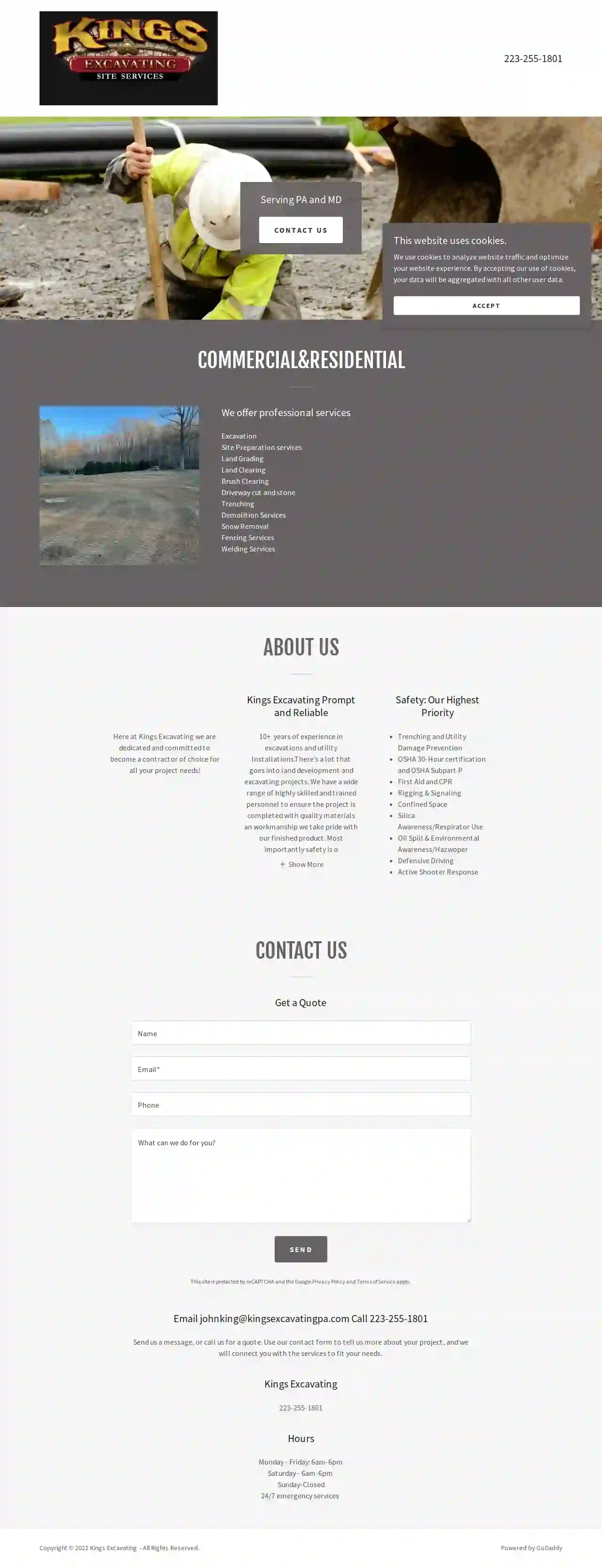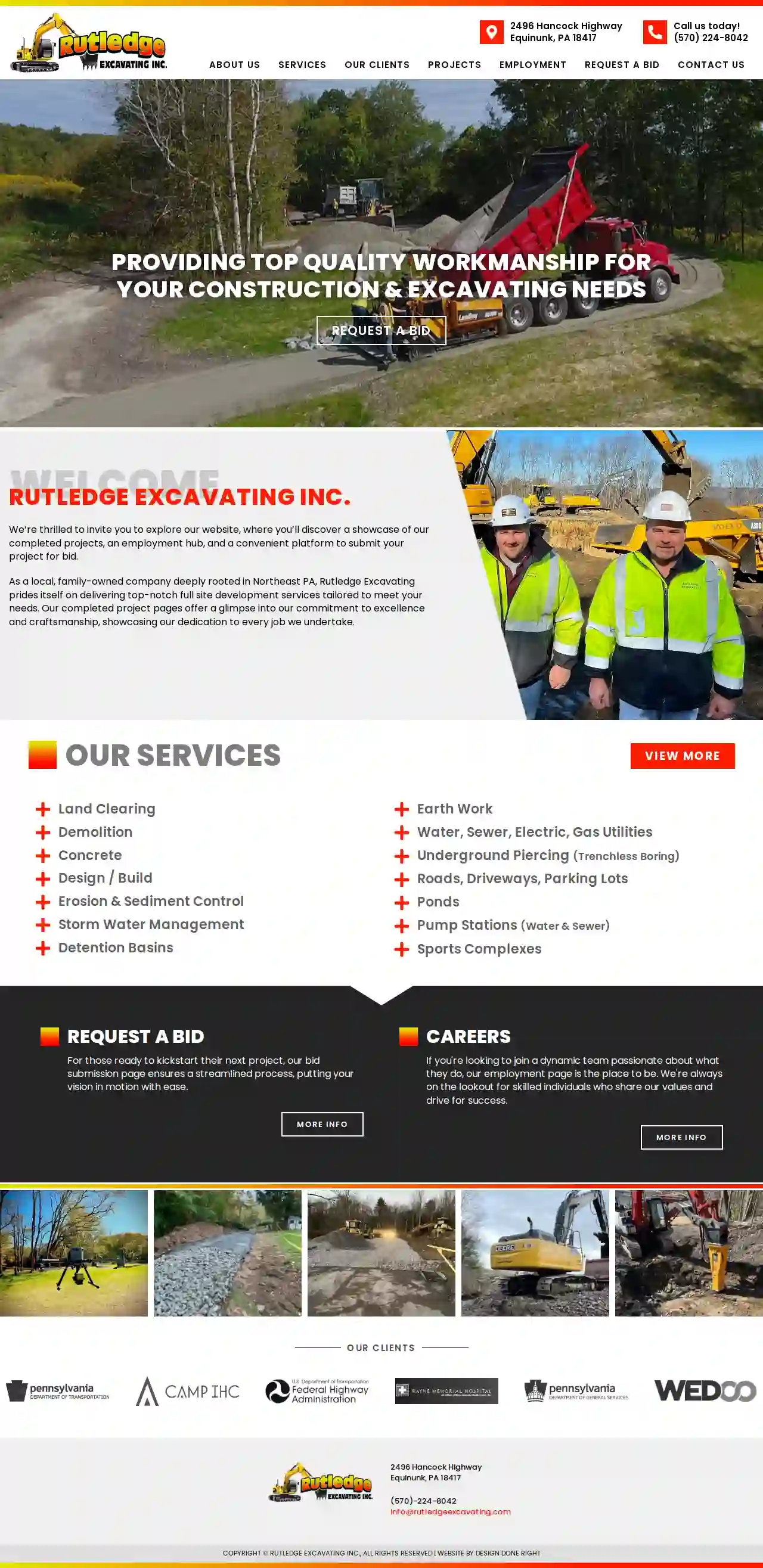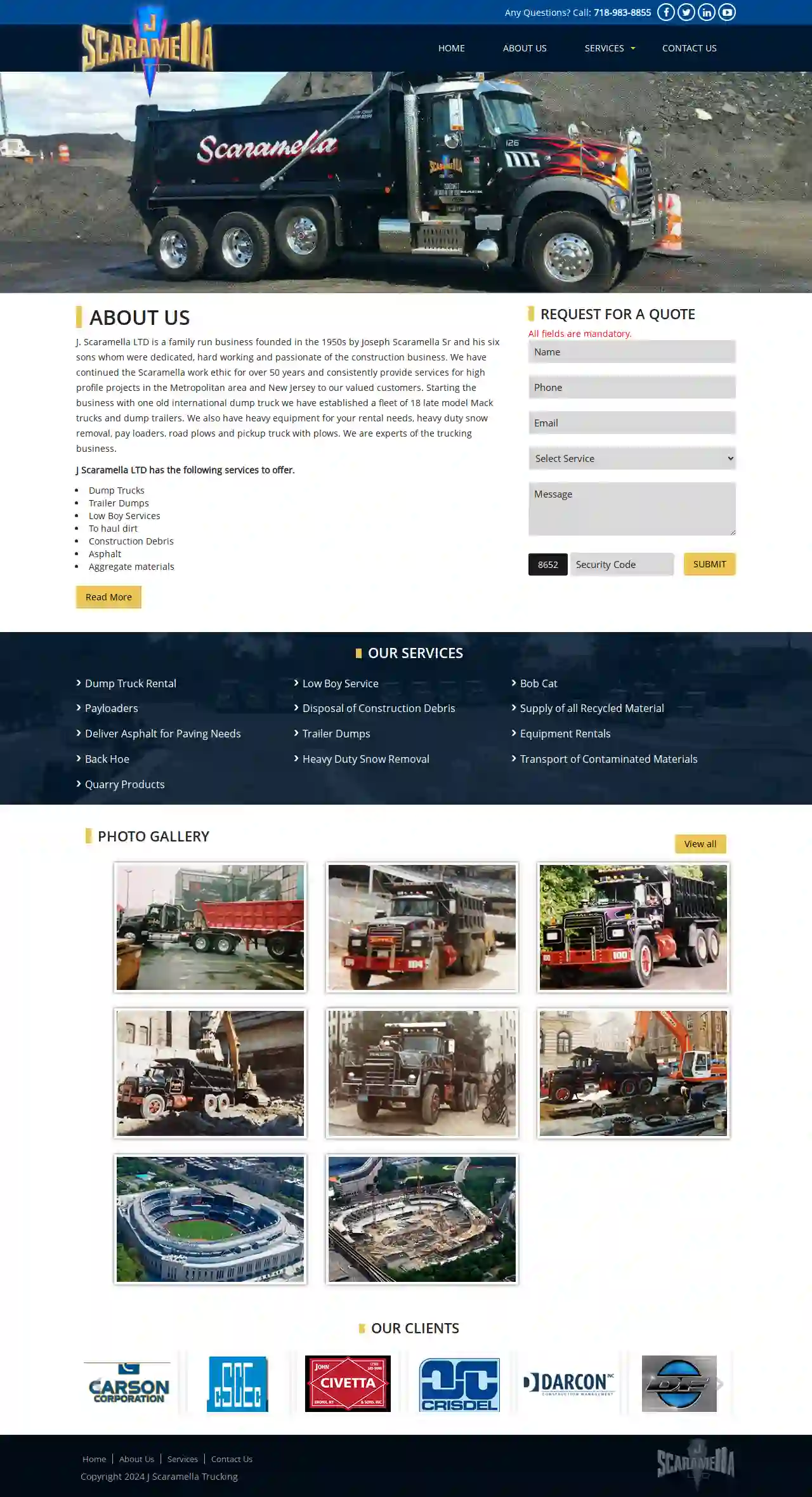Excavation Contractors New Britain
Best Excavation Contractor in New Britain
Receive multiple Land Excavation quotes for your project today! Compare profiles, reviews, accreditations, portfolio, etc... and choose the best deal.

Mundis Excavating
53 reviews80 Manor Road, 80 MANOR ROAD, Red Lion, 17356, USAbout Us Red Lion local, Bob (Bobby) Mundis is the owner-operator of Mundis Excavating. Bob is the third generation excavator. He has 20+ years of experience in heavy equipment operation. Bob started his career as an operator for his father, Jay E. Mundis Excavating. He then moved on to become a project coordinator and later an estimator for a commercial contractor in Baltimore, MD. Bob oversaw projects in such institutions as NASA, Johns Hopkins University, and Johns Hopkins Hospital. In 2018, Bob decided to open his own excavating company in his home town of Red Lion. Maria Mundis Wife of Bob Mundis, Maria is the Controller of Mundis Excavating. Before graduating from Penn State University with Bachelor's of Science in Electro-Mechanical Engineering, Maria gained some work experience in banking industry. After completing an internship at Johnson Controls, Inc., Maria chose to become a stay-at-home mom to her and Bob's two children, later to begin helping Bob with his business. Family Owned Small Business Mundis Excavating was established in 2018 as a dream of one family to use our talents for honest service to others. Our company motto is: "A just scale and a fair measure." Our continuous goal is to work tirelessly in order to provide our customers with the best service and quality of work at affordable prices. We hope to continue growing our company in the years to come. Our Promise We are committed to providing honest and prompt service. The integrity of our business is our priority.
- Services
- Why Us?
- Our Team
- Gallery
Get Quote
ES Excavation
56 reviewsESExcavation.com, Newtown Square, Pennsylvania, 19073, USExcavation Contractors serving Southeast PA If you are a residential or commercial customer in Southeast PA and the surrounding region, ES Excavation is here to help anytime you need someone to dig in the dirt. We are a full-service excavating contractor, and can also provide you with landscape design and storm water solutions. We aim to complete each of our projects in an efficient and cost-effective way. We don’t cut corners and we always take proper precautions to prevent any potential problems and dangers while striving to ensure that the project is complete on time and under budget. We take the time to meet with all of our clients to ensure that every project is completed to their standards. Providing us with your vision, goals and timeline allows us to do our job even better. Every client we meet and do business with is satisfied with our work. That’s because we work with you, and have a genuine interest in achieving your project goals.
- Services
- Why Us?
- Gallery
Get Quote
Kings Excavating
Pittsburgh, USKings Excavating: Prompt and Reliable Here at Kings Excavating, we are dedicated and committed to becoming your contractor of choice for all your project needs! With over 10 years of experience in excavations and utility installations, we have a wide range of highly skilled and trained personnel to ensure your project is completed with quality materials and workmanship. We take pride in our finished product, and most importantly, safety is our number one priority. We strive to create a safe working environment for our employees and the public throughout every project. Safety: Our Highest Priority We prioritize safety in all our operations, adhering to the highest industry standards. Our team is equipped with the necessary certifications and training to ensure a safe and efficient work environment. Our commitment to safety includes: Trenching and Utility Damage Prevention OSHA 30-Hour certification and OSHA Subpart P First Aid and CPR Rigging & Signaling Confined Space Silica Awareness/Respirator Use Oil Spill & Environmental Awareness/Hazwoper Defensive Driving Active Shooter Response
- Services
- Why Us?
- Gallery
Get Quote
Rutledge Excavating Inc.
3.56 reviews2496 Hancock Highway, Equinunk, 18417, USWELCOME RUTLEDGE EXCAVATING INC. We’re thrilled to invite you to explore our website, where you’ll discover a showcase of our completed projects, an employment hub, and a convenient platform to submit your project for bid. As a local, family-owned company deeply rooted in Northeast PA, Rutledge Excavating prides itself on delivering top-notch full site development services tailored to meet your needs. Our completed project pages offer a glimpse into our commitment to excellence and craftsmanship, showcasing our dedication to every job we undertake. OUR SERVICES View More Land Clearing Demolition Concrete Design / Build Erosion & Sediment Control Storm Water Management Detention Basins Earth Work Water, Sewer, Electric, Gas Utilities Underground Piercing (Trenchless Boring) Roads, Driveways, Parking Lots Ponds Pump Stations (Water & Sewer) Sports Complexes REQUEST A BID For those ready to kickstart their next project, our bid submission page ensures a streamlined process, putting your vision in motion with ease. MORE INFO CAREERS If you're looking to join a dynamic team passionate about what they do, our employment page is the place to be. We're always on the lookout for skilled individuals who share our values and drive for success. MORE INFO
- Services
- Why Us?
- Gallery
Get Quote
Scaramella Trucking
3.76 reviewsYork, USAbout Us J. Scaramella LTD is a family-run business founded in the 1950s by Joseph Scaramella Sr and his six sons, who were dedicated, hard-working, and passionate about the construction business. We have continued the Scaramella work ethic for over 50 years and consistently provide services for high-profile projects in the Metropolitan area and New Jersey to our valued customers. Starting the business with one old international dump truck, we have established a fleet of 18 late-model Mack trucks and dump trailers. We also have heavy equipment for your rental needs, heavy-duty snow removal, pay loaders, road plows, and pickup trucks with plows. We are experts in the trucking business.
- Services
- Why Us?
- Gallery
Get Quote
CAG Construction Corporation
1540 Castleton Ave., Staten Island, USCAG CONSTRUCTION CORP. CONSTRUCTION DONE RIGHT Our experience ensures that your projects will be completed within budget, on time and with the upmost professionalism. LEARN MORE Family Run and Operated Construction Company Since 2007
- Services
- Why Us?
- Gallery
Get Quote
Liberty Excavators Inc
3.123 reviewsHarrisburg, USWho is Liberty Excavators? Headquartered near Harrisburg, PA, Liberty Excavators is recognized as one of the Mid-Atlantic’s most respected and reliable turnkey site contractors, based on a solid track record spanning over 40 years. Our experienced workforce and state-of-the-art equipment fleet provide us with both the experience and resources to professionally deliver a quality-finished product in the time frame our customers require. Specializations Liberty Excavators specializes in a wide range of projects, including: Turnkey Site Development Warehousing Shopping Centers Industrial Commercial / Residential Site Development Military and Federal Government Healthcare Higher Education Housing Developments Energy (Oil and Gas) Crushing Heavy Equipment Hauling Water / Waste Water Treatment Plants Sewer / Water Utility Line Installation
- Services
- Why Us?
- Gallery
Get Quote
Kuharchik Construction
4.428 reviews420 Schooley Ave, Exeter, 18643, USWE ARE KUHARCHIK CONSTRUCTION. Providing superior electrical contracting services throughout Pennsylvania since 1973. We’re local, we’re family owned, we’re union! Kuharchik is your first choice in Electrical Contracting. From Highway Signing & Lighting to Foundation Installation, we take pride in every job that we do.
- Services
- Why Us?
- Gallery
Get Quote
NYC Excavation Contractor
York, USAbout NYC Excavation Contractor NYC Excavation Contractor is a premier provider of excavation services in New York City. With a dedicated team of professionals and top-of-the-line equipment, we deliver unmatched quality in every project we undertake. Our commitment to excellence has earned us a reputation for delivering exceptional results. From clearing land to precision grading, we have successfully completed numerous projects, exceeding client expectations at every turn. Our Commitment Missions & Values Driven by Purpose Our Mission To provide reliable, efficient, and top-quality excavation services to our clients, ensuring their projects are successful and their visions are brought to life. Core Principles Our Values We uphold integrity, professionalism, and client satisfaction as the cornerstones of our operations, fostering relationships based on trust, transparency, and mutual respect. Our Journey Company History Founded in the heart of NYC, NYC Excavation Contractor has grown from humble beginnings to become a trusted name in the industry. With a track record of excellence, we continue to push boundaries and set new standards. Over the years, we have expanded our services, improved our techniques, and embraced innovation to stay at the forefront of the excavation sector. Our journey is defined by continuous growth and a relentless pursuit of perfection.
- Services
- Why Us?
- Testimonials
- Gallery
Get Quote
G. A. Peak Excavating, Inc.
516 reviews2850 Clymer Avenue, Telford, 18969, USAbout G.A. Peak Excavating, Inc. G.A. Peak Excavating, Inc. is a family-owned and operated business that has been serving the Telford, PA area since 1983. We are committed to providing our clients with high-quality excavation services at competitive prices. Our team of experienced professionals is dedicated to providing our clients with the best possible service. We are fully licensed and insured, and we are committed to safety and environmental responsibility. We understand that every project is unique, and we work closely with our clients to ensure that their needs are met. We are committed to providing our clients with the best possible service, and we are always available to answer any questions or concerns they may have. We are proud to be a part of the Telford community, and we are committed to providing our clients with the best possible service. We are always available to answer any questions or concerns they may have.
- Services
- Why Us?
- Gallery
Get Quote
Over 22,076+ Excavation Contractors on our directory
Our excavation experts operate in New Britain and surrounding areas!
ExcavationHQ has curated and vetted Top Excavation Pros near New Britain. Find a reliable business today.
Frequently Asked Questions About Excavation Contractors
- Planning and Surveying: Defining the excavation area, marking utility lines, and determining the required depth and grade.
- Site Preparation: Clearing vegetation, removing obstacles, and ensuring site accessibility.
- Excavation: Using appropriate equipment (excavators, backhoes, etc.) to remove earth and create the desired excavation.
- Hauling and Disposal: Transporting excavated material to designated disposal sites, complying with environmental regulations.
- Backfilling and Compaction: Refilling the excavation with suitable material and compacting it to achieve the required density and stability.
- Grading and Finishing: Leveling and shaping the surface to the final grade for landscaping or construction.
- Topsoil Removal: Stripping the fertile topsoil layer from a site, often preserving it for landscaping.
- Trench Excavation: Digging long, narrow trenches for utilities (pipes, cables) or foundations.
- Basement Excavation: Removing earth to create a space for a basement beneath a structure.
- Pool Excavation: Digging a precise hole for installing a swimming pool.
- Roadway Excavation: Removing earth and preparing the ground for road construction.
- Demolition Excavation: Clearing debris and preparing the site after demolition.
- Channel Excavation: Creating channels for drainage or irrigation.
What is the difference between cut and fill excavation?
Cut: Involves excavating soil from an area where the existing grade is higher than the desired grade.
Fill: Refers to using the excavated soil ('cut' material) to raise the grade in an area where the existing grade is lower than desired.
This method minimizes the need to import or export soil, reducing costs and environmental impact. It's commonly used for site preparation, road construction, and landscaping.
What is the excavation process?
What is the difference between topsoil and subsoil?
Topsoil: The uppermost layer, typically rich in organic matter, nutrients, and microorganisms. It's essential for plant growth and is often darker in color.
Subsoil: The layer beneath the topsoil, containing less organic matter and generally denser. It provides support for roots but is less fertile than topsoil.
During excavation, topsoil is often removed and preserved separately for later use in landscaping, while subsoil is typically used for backfilling or other less demanding applications.
What are the different types of excavation?
What is the difference between cut and fill excavation?
Cut: Involves excavating soil from an area where the existing grade is higher than the desired grade.
Fill: Refers to using the excavated soil ('cut' material) to raise the grade in an area where the existing grade is lower than desired.
This method minimizes the need to import or export soil, reducing costs and environmental impact. It's commonly used for site preparation, road construction, and landscaping.
What is the excavation process?
- Planning and Surveying: Defining the excavation area, marking utility lines, and determining the required depth and grade.
- Site Preparation: Clearing vegetation, removing obstacles, and ensuring site accessibility.
- Excavation: Using appropriate equipment (excavators, backhoes, etc.) to remove earth and create the desired excavation.
- Hauling and Disposal: Transporting excavated material to designated disposal sites, complying with environmental regulations.
- Backfilling and Compaction: Refilling the excavation with suitable material and compacting it to achieve the required density and stability.
- Grading and Finishing: Leveling and shaping the surface to the final grade for landscaping or construction.
What is the difference between topsoil and subsoil?
Topsoil: The uppermost layer, typically rich in organic matter, nutrients, and microorganisms. It's essential for plant growth and is often darker in color.
Subsoil: The layer beneath the topsoil, containing less organic matter and generally denser. It provides support for roots but is less fertile than topsoil.
During excavation, topsoil is often removed and preserved separately for later use in landscaping, while subsoil is typically used for backfilling or other less demanding applications.
What are the different types of excavation?
- Topsoil Removal: Stripping the fertile topsoil layer from a site, often preserving it for landscaping.
- Trench Excavation: Digging long, narrow trenches for utilities (pipes, cables) or foundations.
- Basement Excavation: Removing earth to create a space for a basement beneath a structure.
- Pool Excavation: Digging a precise hole for installing a swimming pool.
- Roadway Excavation: Removing earth and preparing the ground for road construction.
- Demolition Excavation: Clearing debris and preparing the site after demolition.
- Channel Excavation: Creating channels for drainage or irrigation.